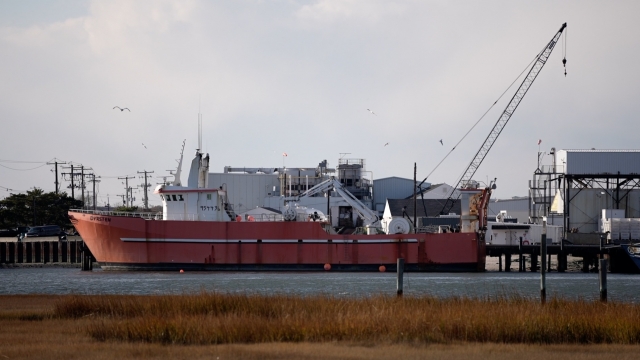An unforgiving southeast wind cut across Cape May, New Jersey, on a recent Tuesday morning; the 50-mile-per-hour gusts were so strong they created white caps on a section of the bay here that is typically calm.
There would be no fishing for Bill Bright and his crew.
"We don't have crop insurance. If the fish don't show up, there's no bailout," the 64-year-old said, standing on the deck of the Eva Marie, an 88-foot-long fishing vessel used to catch herring.
As a lifelong fisherman, Bright is used to slow days. But a recent shift in tidal fortunes here has nothing to do with fish and everything to do with the federal government.
"What's at stake for us is our future," Bright said.
For years, fishermen like Bill Bright and his colleague Wayne Reichle have been required to take federal observers on their boats when they set out into the North Atlantic in search of herring. Those observers are making sure fishermen are catching what they're legally allowed, most of it in efforts to prevent overfishing.
But back in 2020, federal regulators moved to require herring fishermen to directly pay observers salaries, a move that could potentially cost herring fishermen up to $700 per day.
By some estimates, that could top 20% of revenue from a fisherman's catch.
"From the beginning, the most important thing for us was the ability to continue fishing and continue operating the way we've operated for a number of years," Wayne Reichle said.
As a result, Reichle, Bright and a half dozen other fishermen sued the federal government.
SEE MORE: In a surging seafood industry, boat captains struggle to find workers
A case that has rippled so far beyond the shores of New Jersey that it has now ended up before the Supreme Court. Loper Bright Enterprises, Inc. v. Gina Raimondo is set to be argued before the court in January 2024.
"From the beginning, the most important thing for us was the ability to continue fishing and continue operating the way we've operated for a number of years. It's about us being able to maintain our livelihoods and operations," Reichle said.
A ruling in their favor could drastically change how the federal government oversees nearly every industry in the country. Legal experts say the case has the potential to overturn the Chevron doctrine.
Established in 1984, it says that when a law is silent about what is required in a specific situation, federal courts must defer to regulatory agencies like NOAA or the EPA.
Meredith Moore, the Director of the Fish Conservation Program at Ocean Conservancy, is watching the case closely.
"We have really deep concerns, not only about what this means for fish but everyone else who cares about how our government tries to keep us safe and healthy," Moore said.
"The case is taking on the role of science and expertise in the government; it stands to shift the balance of who is deciding those issues. The result of this case could change the way Congress, the Executive Branch, and Judiciary work together," Moore added.
Most of the fishermen involved in the cases never expected this much notoriety. They say they have no problem carrying regulators aboard their boats but don't believe they should have to pay those observers salaries. For them, it's not so much about making history as it is about ensuring their kids and grandkids can afford to keep fishing in these waters in the future.
"There's not a fisherman on this coast that is not watching very closely," Bill Bright said.
Trending stories at Scrippsnews.com





